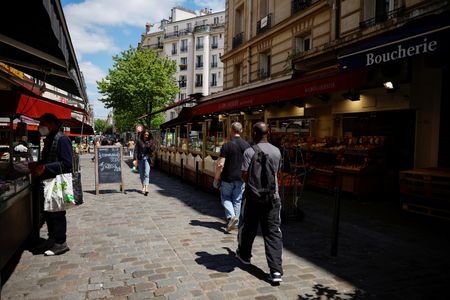By Richard Lough
PARIS (Reuters) – France’s economy eked out meagre growth in the third quarter as household spending stagnated and a sharp jump in inflation in October signalled headwinds looming in the final quarter of the year.
France’s economy grew 0.2% in the July-September period, in line with market expectations, preliminary data from the INSEE official statistics agency showed.
Stubbornly high inflation, export weakness and risks to energy supply will weigh on the euro zone’s second largest economy in the months ahead, analysts said, just as the European Central Bank jacks up rates to tame price rises.
Bank of France Governor Francois Villeroy de Galhau said he saw no reason to revise downwards his forecast for 2.6% GDP growth in 2022 but that there were clear signs of weakness in the eurozone as a whole.
“That means resilient growth this year and at least a significant slowdown next year,” Villeroy told a webcast hosted by financial site Boursorama.
Villeroy, who is also a European Central Bank member, said “substantial” progress had already been made in the ECB’s bid to fight off a historic surge in inflation.
France has fared better than its neighbours in taming price rises thanks in part to early energy price caps and fuel subsidies, but economists have warned that its heavy spending on blanket protection for households is storing up pain for later.
After two consecutive months of slowing inflation in France that bucked the wider euro zone trend, consumer prices surged in October. Food prices were up 11.8% annually while energy prices soared 19.2%.
On an EU-harmonised basis, inflation rose 1.3% month-on-month, leaving the year-on-year rate at 7.1% — nearly a full point higher than in September and surpassing a record high for France of 6.8% for hit in July.
The data came a day after the European Central Bank raised interest rates again, worried that rapid price growth is becoming entrenched. It lifted its deposit rate by a further 75 basis points to 1.5% – the highest rate since 2009.
The outlook for France, remained difficult with inventories likely to make a negative contribution to growth from the next quarter, ING analysts said.
“With investment at half-mast, risks to energy supply, persistently high inflation and an overall slowdown in demand for exports, it is difficult to expect a strong recovery in growth in the second half of 2023,” ING said.
French President Emmanuel Macron this month in a newspaper interview cautioned policymakers against “demand destruction”.
ECB President Christine Lagarde on Thursday pushed back on political criticism that rapid rate hikes threatened to push the euro zone into recession, arguing that her job was to get inflation under control.
(Reporting by Richard Lough; additional reporting by Michel Rose; Editing by Silvia Aloisi, Angus MacSwan, William Maclean)

